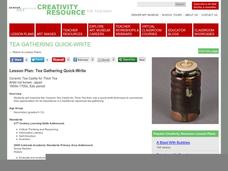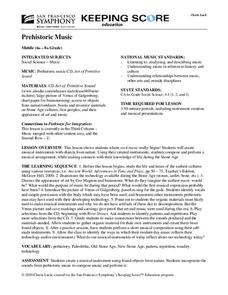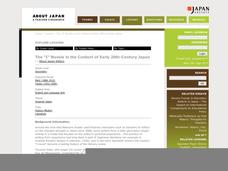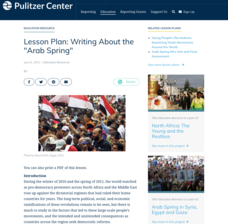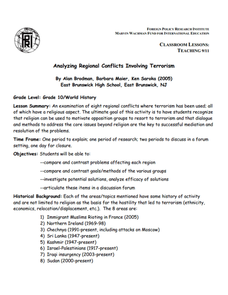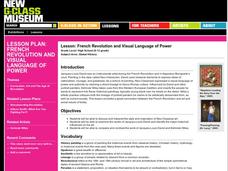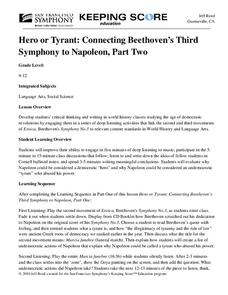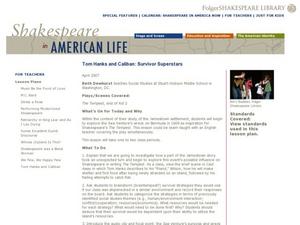Denver Art Museum
Tea Gathering Quick-Write
Japanese tea gatherings are the inspiration for a great activity. Learners are provided with an image of a tea caddy made for thick tea and asked to describe what they notice and what that might mean. This leads into a larger activity...
ARKive
Galapagos Conservation
The Galapagos Islands inspired Darwin to develop his theory of evolution. These wonderful islands will also be the topic of a lesson on habitat and conservation. In small groups, learners will collect and synthesize information regarding...
Denver Art Museum
Communicating with Symbols
Before kids analyze a Chinese dish filled with amazing images, they research the meanings of various plant and animal symbols. They use their research to decode the meaning of the expressive artwork on the dish and then use symbolism to...
San Francisco Symphony
Prehistoric Music
What was music like during the Stone Age? Learners listen to a CD entitled, Art of Primitive Sound as they consider the culture of people in the Stone Age. They use objects found in nature to create instruments, and then perform a...
Curated OER
Lincoln is in the House! ("Name-Dropping" Poems and the Power of Connotation)
“What’s in a name?” Just about everything. Barack Obama, Vincent van Gogh, Justin Bieber. Famous names evoke a multitude of reactions and poets often use the names of famous people in their works precisely because names carry...
Japan Society
The “I” Novels in the Context of Early 20th-Century Japan
Although this lesson plan covers the rather obscure topic of the Japanese "I-novel", it also includes a great deal of historical information and material for an in-depth discussion of universal literary concepts. Specifically, young...
Pulitzer Center
Writing About the "Arab Spring"
An information-rich resource, this webpage will provide your class with all the information they need to explore a relevant real-world and little understood topic: the Middle East and the people's revolutions that shook it in the spring...
Foreign Policy Research Institute
Teaching the 9/11 Anniversary
Here is a lesson on terrorism and 9/11. While outdated, it could be easily revised for today's teens. It includes targeted vocabulary, a background information activity, critical thinking questions, and step-by-step procedures for...
Foreign Policy Research Institute
Life in a Totalitarian State
This interesting role-playing activity helps your class understand some of the qualities of totalitarianism by assigning each one as a spy or comrade citizen for a duration of five days. Students should find this highly engaging and...
Foreign Policy Research Institute
Analyzing Regional Conflicts Involving Terrorism
This is a week-long lesson on analyzing the similarities and differences between sources of tension and terrorism in eight locations around the world. The class is divided into eight groups and assigned one of the locations to research....
Foreign Policy Research Institute
Exploring Korea
A thorough and fun lesson on Korea! In groups of four (Social Chair, Historian, Translator, Travel Agent) class members research North and South Korea to determine a good location for an overseas institute for studying abroad. Once this...
New Class Museum
Lesson: French Revolution and Visual Language of Power
Take a look at the French Revolution and neo-classic art, then compare it to current social issues and contemporary art. Kids analyze several pieces painted by Jacques-Louis David in regard to style and subject then compare them to...
San Francisco Symphony
Hero or Tyrant: Connecting Beethoven’s Third Symphony to Napoleon, Part Two
Was Napoleon a tyrant or a hero? Answers could vary depending on the political point of view. Learners listen to Beethoven's Symphony #3 while considering Napoleon's undemocratic tyranny. They listen to the piece in five parts, each time...
Japan Society
The Russo-Japanese War, 1904-1905: A Turning Point in Japanese History, World History, and How War is Conveyed to the Public
The big question: How did Russo-Japanese War imagery and the press influence Japanese perception of the war? Learners consider this big question as they compare and contrast various artistic media from the period. The lesson is...
Curated OER
Jim Crow Lesson Plan
Jackie Robinson's attempt to earn a spot on the 1946 Brooklyn Dodgers provides learners with an opportunity to examine the Jim Crow laws and revisit issues of segregation and integration. "The Unconquerable Doing the Impossible: Jackie...
The New York Times
'The Century's Bitterest Journalistic Failure'? Considering Times Coverage of the Holocaust
Rich with primary sources and additional resources, this plan asks class members to think critically about newspaper coverage of the Holocaust. Focusing in particular on the analysis of the article "150th Anniversary: 1851-2001: Turning...
Curated OER
Allies and Actions
How can we create “a more respectful, inclusive school community?" What can an individual do to make a member of an excluded or disrespected group feel more respected and included? What can the community do? Class groups record their...
Learning to Give
We Can Help to Make a Change!
The importance of accepting those who are different is the subject of a service learning project. Upper graders craft presentations for younger learners on ways to include everyone in the school community and to decrease the feelings of...
Power Show
Out of the Dust
Is your class reading Out of the Dust? If they are, or if this is your first time teaching Karen Hesse's Newbery Medal winning novel, check out the ideas in a presentation that outlines what you and your class can do while reading about...
Power Show
Introduction to Out of the Dust
Powerful images set the stage for Karen Hesse's historical fiction novel, Out of the Dust. The photos, maps, quotes from the text, critical thinking questions, and background information on the Dust Bowl period are all included, and will...
Shakespeare in American Life
Tom Hanks and Caliban: Survivor Superstars
Here’s a clever way to combine language arts and social studies. Shakespeare’s The Tempest is believed to have been inspired by the wreck of the Sea Venture on Bermuda in 1609. The class views a brief scene from Castaway in which Tom...
Annenberg Foundation
Controversial Issues in Practice
Wow! This resource provides three related lessons on the First Amendment that challenge US government students to explore their personal opinion on the separation of church and state. Each lesson can be adjusted in length, but is...
Education World
Where in the World is Mrs. Waffenschmidt? #6
One of a series of geography worksheets that requires reading a paragraph with clues in order to determine the location of the fictional explorer, Mrs. Waffenschmidt. Reproducible with two per page.
Time Warp Trio
The Seven Blunders of the World
Learners explore the cultures and civilizations of Mesopotamia. They take a look at the factors that shaped the region, and study the history of the Hanging Gardens of Babylon, and other ancient wonders of the world. The class is divided...


